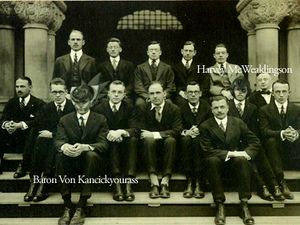User:Pentium5dot1/Storage facility/Newton v. Leibniz

Isaac Newton, or Mr Newton as he was known to his friend, and Gottfried Wilhelm Leibniz, or Nitzy as he was known to his wide circle of friends, were contemporaries of each other. Their lives overlapped not only by temporal coincidence, but also by virtue of each inventing what is today known as calculus mathematics.
The quarrel[edit | edit source]
The credit for earliest invention is given to Newton but everybody uses Leibniz's notation, perhaps because Leibniz was more popular. Newton called his maths "Fluxions", which was a reference to the notion of continual change in a function which makes it difficult to get the same answer twice. Leibniz called his "Calculus", in honour of his passing a large kidney stone a few days earlier, which was all the more impressive by his insistence on working it out with a pencil. It is from "calculus" that we derive the word "calculate", which for most of us is all we manage to successfully derive.
Newton claimed that Leibniz had stolen his idea for calculus, despite never having told anybody about it, except possibly Leibniz. Unfortunately for Newton he had no documentary proof of having known about Fluxions before Leibniz published his paper. Fortunately for Newton he worked at Cambridge and so everybody believed him. However, Leibniz, by having more friends, was able to sway the argument in his favour.
Newton claimed to have invented Fluxions in 1666, surrounded by rats during the great plague. Leibniz invented his Calculus in 1674, surrounded by the same rats selling information. Leibniz published his ideas in 1684, whereas Newton's were published in 1687.
The argument raged on for over a hundred years before reaching a limiting factor in the form of "being bothered" tending towards zero, and thus fizzling out. Today we consider that both Newton and Leibniz invented calculus independently, though it remains universally acknowledged that Leibniz had more friends.
